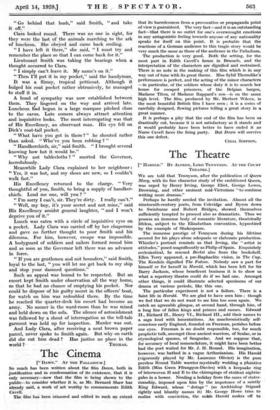The Cinema
144 DAWN." AT TILE PALLADIUM.] SO much has been written about the filin Dawn, both in justification and in condemnation of its existence, that it is only necessary—now that the film is being shown to the public—to consider whether it is, as Mr. Bernard Shaw has already said, a work of art worthy to commemorate Edith Cavell.
The film has been 'censored and edited to such an extent
that its harmlessness from a provocative or propaganda point of view is guaranteed. The very fact--and it isnn outstanding 'fact—that there' is no outlet for one's overwrought emotions in any antagonistic feeling towards anyone of any nationality speaks for itself on this point. It is probable that the reactions of a German audience to this tragic story would be very much the same as those of the audience in the Palladium.
The production is very good. Both the setting, for the most part in Edith Cavell's house in Brussels, and the interpretation of 'the characters are dignified and restrained. There is no 'note in the making of this film which is in any way out of tune With its great theme. Miss Sybil Thorndike'i performance is perfect, and the acting of the minor characters —in particular, of the soldiers whose duty it is to search her house for escaped prisoners, of the Belgian bargee, Madame Titou, of Madame Ftappard's son—is on the same high level. The film, produced by Mr. Herbert Wilcox, is the most beautiful British film I have seen ; it is a series of carefully designed, flowing pictures telling a great story in a great manner.
It is perhaps a pity that the end of the film has been so drastically cut, because it is not satisfactory as it stands and. it would probably have been better to have ended it as Nurse Cavell faces the firing party. But Dawn will survive
CELIA SIMPSON.




































 Previous page
Previous page